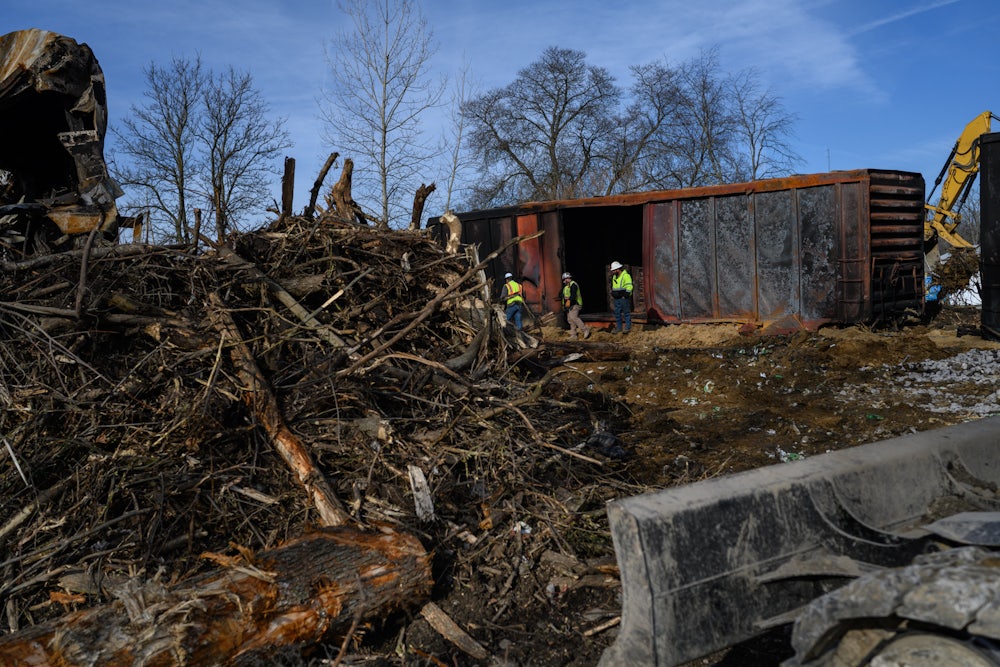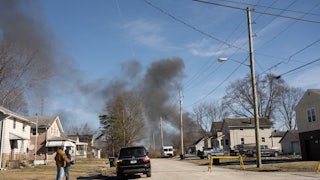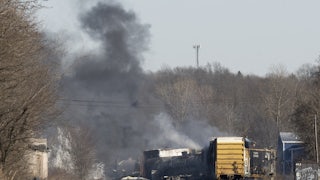In the wake of the Norfolk Southern train derailment in East Palestine, Ohio, conspiracy has run rampant about how this disaster happened, and whether there is a deeper sinister plot underlying it. As residents try to navigate the unprecedented situation, seeking support from their neighbors and from Facebook groups, disinformation is flourishing.
Conspiracy theorists online appear less concerned with the actual residents’ turmoil, and more with using them to advance narratives that foster social distrust of government and even of other people. Yet many residents have in fact relied on each other while hoping for a stronger, not weaker, government response.
Stew Peters, for example, has positioned himself as an East Palestine truth-teller. He asserts there are “crickets from the media,” while it seems he only began tweeting about the situation days ago. (Meanwhile, The New Republic, dedicated local reporters, and many other media outlets had already been covering it.) Perhaps Peters only began to focus on the disaster once he realized he could use it to farm traffic toward the rest of his content; his account is littered with posts, from implying Damar Hamlin has been replaced with a doppelganger to run-of-the-mill anti-vaccine content and posts attempting to stoke racial hatred.
Peters is one of many right-wing conspiracy theorists doing the same thing. Ian Miles Cheong insinuated that the government’s poor response to the disaster was because of the demographics of East Palestine, which is majority white. Benny Johnson has claimed that the “climate cult” is silent on the matter. Jack Posobiec propped up a clip of Ohio Senator J.D. Vance brazenly saying that “the leaders of this country have decided to disregard the people of East Palestine,” as if he has done anything substantive for them.
What’s concerning is how these figures have likely ensnared people who are reasonably concerned for the residents of East Palestine into a potential radicalization pipeline. If someone finds them to be revealing unspoken truths about something that seems normatively bad, they may come to see the rest of their more vicious content as equally worth consideration.
None of these figures are advocating for a coherent political vision that would actually help the people they purport to care about. They play off people’s well-founded distrust of power structures, but instead of channeling those feelings into strategies for how to make power serve the people, they focus mainly on casting villains for their own sake—to create targets to pile on and people to hate.
In the case of East Palestine, there is no greater conspiracy than what’s already in front of us. The derailment is a classic story of corporate greed—tolerated by bipartisan permission—successfully chasing profits and shaving away much-needed regulation, leaving us and the environment worse off because of it all. It’s a story that doesn’t fit nicely on superficial party lines, but is part of a dynamic that only a growing number of progressives—not conservative Democrats or Republicans or libertarians—have spoken to for years.
Norfolk Southern is a $55 billion company that recently reported record fourth-quarter and annual revenues; just last year, the company announced $10 billion in stock buybacks. It is also among the massive corporations that have successfully lobbied against industry improvements like updating the same braking system that failed in East Palestine.
In fact, a similar Norfolk Southern–owned operator crash in New Jersey in 2012 was part of what prompted the Obama administration to order the braking system updates for trains carrying a certain amount of hazardous materials in 2014. But the Trump administration rolled it back and President Biden has yet to reinstate the rule. Meanwhile, rail workers (who just had a rail contract imposed upon them) had been warning for years about how corporate malfeasance both infringes upon their labor rights and risks public safety.
Seldom, however, will you hear any of the aforementioned “truth-tellers” advancing the cause of workers’ rights, or stronger government regulation to hold corporations accountable and keep the environment safe. Instead, they lazily attack the “climate cult” and mock the kind of change that would have prevented a disaster like this in the first place.
These cynical figures will play to people’s good senses, their warm-hearted concern for their neighbor—and then warp them into senses far worse. While these frauds inundate us with conspiracy, they divert attention away from the cold, basic truths of capital-driven politics that allows corporations to chase profits with reckless abandon.
We don’t have to try uncovering some deeper, shrouded ploy or cabal that has led to this human and natural suffering: The machinations are right in front of us, begging to be seen.






